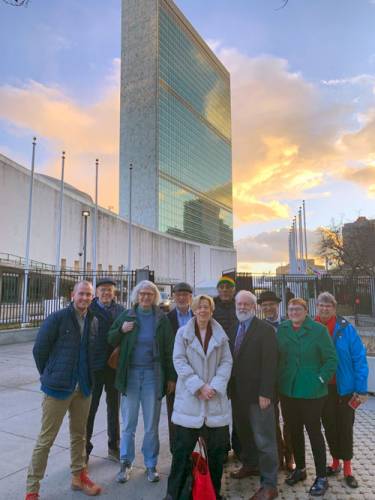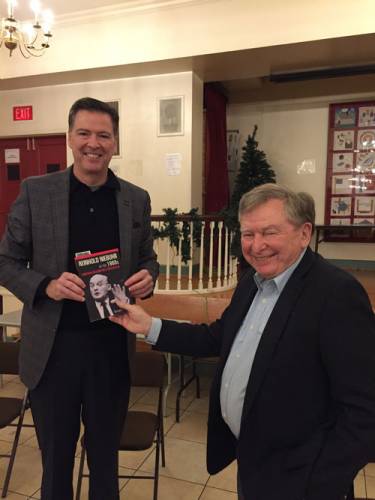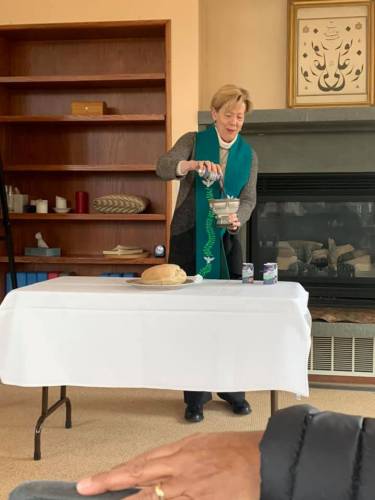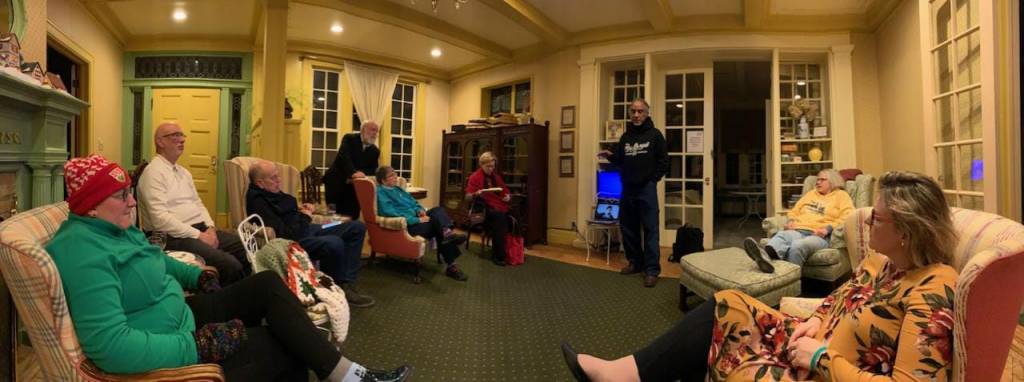ACSWP visits United Nations, prepares GA reports at Stony Point
Gathering first at the Church Center for the United Nations on Jan. 16, the Advisory Committee on Social Witness Policy (ACSWP) followed a full day of meetings with another two days at Stony Point Center, reviewing reports that will be going to the General Assembly. It was more interesting than you might expect!
 The Presbyterian Ministry at the United Nations hosted the committee and helped it meet with a very impressive team of ecumenical colleagues to test a proposal going to GA. That proposal, “Reimagining the World House,” is for an ecumenical study forum to strengthen Christian voices in the national debate over foreign policy. Along with commitments to human rights, diplomacy and international law, the Presbyterian Church (U.S.A.) has also encouraged more international cooperation on matters such as climate change, migration, religious freedom, and equal treatment for women and children. In a climate where ethno-nationalism and authoritarianism are increasingly powerful and religious and ethnic minorities are being flagrantly mistreated, the U.S. churches themselves need to hear from our international partner churches.
The Presbyterian Ministry at the United Nations hosted the committee and helped it meet with a very impressive team of ecumenical colleagues to test a proposal going to GA. That proposal, “Reimagining the World House,” is for an ecumenical study forum to strengthen Christian voices in the national debate over foreign policy. Along with commitments to human rights, diplomacy and international law, the Presbyterian Church (U.S.A.) has also encouraged more international cooperation on matters such as climate change, migration, religious freedom, and equal treatment for women and children. In a climate where ethno-nationalism and authoritarianism are increasingly powerful and religious and ethnic minorities are being flagrantly mistreated, the U.S. churches themselves need to hear from our international partner churches.
ACSWP heard from representatives of the African Methodist Episcopal Zion Church; the United Methodist Church; the Mennonite Central Committee; the Episcopal Church; and Caritas, the chief international relief arm of the Roman Catholic Church. As hoped, each had a somewhat different angle of vision on how to create consensus — even among the churches — for a more peaceful and just community of nations and on how to get more of the churches’ light out from under the bushel. The results of this discussion are being added to insights from an international gathering in November (see https://www.presbyterianmission.org/story/standing-together-in-a-world-divided/) and comments from Presbyterian ethicists in the Social Ethics Network earlier in January (more on this later in this report).
After a tour of the United Nations’ historic assembly halls, the committee met with James Sutterlin, a Presbyterian member of the Security Council staff, for a briefing on current matters before that body, relief for Syria, tensions between the U.S. and Iran and Iraq, populations under threat of persecution, and positive work on the Sustainable Development Goals (see presbyterianmission.org/resource/study-devotional-guide-for-the-sustainable-development-goals). To say that the senior staff of the U.N. are always under pressure would be an understatement.
The committee then met over dinner with the Rev. Phil Tom, convener of the Urban Ministry Network (UMN), and the Rev. Dr. Robert Foltz-Morrison, executive presbyter of New York City Presbytery. Tom has written a summary of the UMN’s work since 2014. Foltz-Morrison reported on some of the presbytery’s mission to the group. After dinner (and rush hour), the members were transported to their base at Stony Point Center.
Getting down to ACSWP business
As is usual at its meetings, on Friday the committee heard from liaison members from the Advocacy Committees on Women’s Concerns and Racial Equity, its member on Mission Responsibility Through Investment (MRTI), its co-chairs, coordinator and the managing editor of Unbound (justiceunbound.org), an internet journal that serves ACSWP and the broader Compassion, Peace & Justice ministries area. Managing editor Lee Catoe noted the considerable redesign of the Unbound site he did after authorization at the committee’s meeting in Baltimore in October. The committee called for more alerts to go to those who subscribe.
 The committee also heard a brief update from the Social Ethics Network, a group of professors who assist ACSWP on study projects and who currently meet before annual meetings of the Society of Christian Ethics. This year, that network had a valuable informal discussion with James Comey, author of “A Higher Loyalty” and a big fan of the late ethicist Reinhold Niebuhr.
The committee also heard a brief update from the Social Ethics Network, a group of professors who assist ACSWP on study projects and who currently meet before annual meetings of the Society of Christian Ethics. This year, that network had a valuable informal discussion with James Comey, author of “A Higher Loyalty” and a big fan of the late ethicist Reinhold Niebuhr.
What was not usual was the news received from a representative of the Office of the General Assembly, who informed the committee that its request for exceptions to length limits on certain reports was denied, as all such requests would be. Where previous Stated Clerks had recognized that the scope of studies the committee is mandated to follow would sometimes yield reports over 10,000 words (See “Why and How the Church Makes a Social Policy Witness with Study Guide, 1993“), the last General Assembly cut that number to 5,000 to reduce costs of the translation of all GA business into Korean and Spanish. Longer study material may still be posted on pc-biz.org, but as appendices separate from the summaries and recommendations.
The committee discussed how it would adapt previously prepared reports to the new requirements, given that each report reflects both its subject matter and the editorial decisions of the Presbyterian volunteers who comprise the study teams. The members were united in supporting the policy of translation, but glad that the Office of the GA was distinguishing among recommendation and study sections. Some resolutions are short, but others — often written by experts in their subject areas — are meant to stand comparison with products of think tanks and advocacy groups, with shorter summary statements and annexes as needed.
The committee proceeded to discuss the following draft reports:
- Robert Trawick, professor of religion and philosophy at St. Thomas Aquinas University, presented the report on changes in Jerusalem, requested by the 2018 General Assembly. Rachael Eggebeen, co-chair of the committee, and the Rev. Raafat Girgis, member of the Racial Equity Advocacy Committee, were also members of that study team that visited the city in July 2019 and met with people from all three Abrahamic faiths in their research. The committee decided to move most of the background study to an appendix, while strongly affirming both parts of the report. The report looks at the impact of exclusionary theologies in Judaism, Islam and Christianity and at the accelerated annexation by the Netanyahu government during the Trump administration.
- The Revs. Chris Iosso and Kevin Johnson presented and discussed the deeply evocative paper done on the impacts of gun violence in Baltimore, and other parts of a report on urban ministry in Baltimore. The paper in question, tentatively titled “Lazarus in Baltimore,” was written by the Rev. Dr. Robert Hoch, pastor of First and Franklin Presbyterian Church, and is envisioned as a theological and ethical resource for commissioners seeking to understand challenges facing the GA city. The committee anticipates a description of urban ministry from several African American Presbyterian churches being assembled by the Rev. Michael L. Moore of Knox Presbyterian Church, and will then finalize two documents for GA.
- Douglass Sullivan-González, professor of Latin American history and dean of the Sally McDonnell Barksdale Honors College at the University of Mississippi, presented the report on Central America requested by the 2018 General Assembly. He described the five-person study team’s visits to Honduras, El Salvador and Guatemala (the Northern Triangle) and then to Nicaragua and Costa Rica, in both cases meeting with mission partners and a range of legal, academic and governmental resource people, from human rights reporters at Jesuit Radio Progreso in Honduras to senior officials at the U.S. Embassy in Nicaragua to theologians at the Latin American Biblical University in Costa Rica. Part of the report covers the current situation, part covers the relevant history of internal dynamics in each country, and part covers recommendations for public policy, mission strategy and congregational education. In addition to Chair Sullivan-González, study team members the Rev. Caroline Unzaga and the Rev. Dr. Robert Brashear also spoke. Unzaga noted the immigration issues that were not the center of the study but were inescapable. Brashear noted his participation in the study teams of the 1980s, a time of brutal repression in El Salvador and Guatemala especially, and of the Reagan Administration’s not-so-covert war on Nicaragua’s Sandinistas. Now the Ortega family, ostensible Sandinistas, have come to emulate the dictatorship of the Somozas they fought to overthrow, prompting theological reflection on the fragility of democracies. The committee affirmed the report, requesting adjustments to the recommendations and background structure.
- The Rev. Susan Smith, stated clerk of Monmouth Presbytery and a former banker, presented the Update of Energy Policy requested by the 2018 General Assembly. As with the Jerusalem report, an earlier version had been presented in October. The update covers “green taxes” and other measures to price carbon while also giving serious attention to environmental racism, or the location of toxic/extractive industry or waste near poorer and frequently minority communities. It effectively addresses component policies in any “green deal,” or legislation linking sustainability and employment. The update also brings together many smaller resolutions made by the General Assembly and celebrates the 30th anniversary of the comprehensive policy Restoring Creation For Ecology and Justice (presbyterianmission.org/wp-content/uploads/restoring-creation-for-ecologyjustice.pdf). A poster created to go with the update notes that the PC(USA) has been addressing ecology and the environment steadily since 1970.
- Sylvia Thorson-Smith, retired professor of gender and sexuality studies at Grinnell College, presented a proposal that she and several members developed for an updating of the 2004 policy “Transforming Families” (org/wp-content/uploads/3-transformingfamilies-2004.pdf). Since that time, the Church’s position on same-sex marriage has changed and other cultural changes have raised many pastoral and policy concerns; this update would help the Church understand the issues at stake, and the continuing impacts of economics and technology on family life (such as the current “cratering” of the birth rate and decline in the marriage rate). Christian faith has does not idolize the family, but has great interest in understanding how God’s love can best touch people through family life.
 The committee heard a brief report on a study approved by the 2018 General Assembly on the teaching of the humanities in Presbyterian Church-related colleges and universities. Though this plan for a joint study by the Church and the schools involved was seen as a needed way to explore how these institutions were facing pressures to weaken course offerings in this area (which includes English, other languages, religion, philosophy, history and the arts), the task force on this was not appointed due to limitations on the applicant pool, as determined by the GA Nominating Committee.
The committee heard a brief report on a study approved by the 2018 General Assembly on the teaching of the humanities in Presbyterian Church-related colleges and universities. Though this plan for a joint study by the Church and the schools involved was seen as a needed way to explore how these institutions were facing pressures to weaken course offerings in this area (which includes English, other languages, religion, philosophy, history and the arts), the task force on this was not appointed due to limitations on the applicant pool, as determined by the GA Nominating Committee.
Rick Ufford-Chase, co-director of the conference center, also spoke with ACSWP. He focused on a proposed “revival” or “road show” of inspiring tent gatherings across the country, intended to present the Church’s message in a new/old way to younger people, possibly involving teams from colleges and universities. He also spoke to the Presbyterian Mission Agency’s affirmation of Stony Point as a laboratory for Matthew 25-inspired ministries, and described the Community of Living Traditions (Islam, Judaism, Christianity) and other programs of the center.
The last substantial topic for discussion was the revisioning of the place of social witness itself in the Church’s life, given considerable changes in national and regional structures since the thorough study of policy-making itself, done in 1993 to incorporate insights from the Brief Statement of Faith. ACSWP’s work is designed theologically on a model of discernment that draws on a range of disciplines to serve the deliberation of the General Assembly and its council, now the Presbyterian Mission Agency. The committee authorized further work on a consultation with ethicists and social ministry practitioners to look at how changes in Church ethos and cultural context might re-frame the social witness, policy and related program tasks. This, in turn, would be reflected in changes in the committee’s Manual of Operations and possible actions for both the PMA and the General Assembly.
For further information on the reports discussed above, please contact acswp@pcusa.org.
